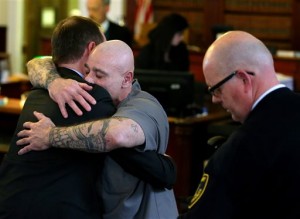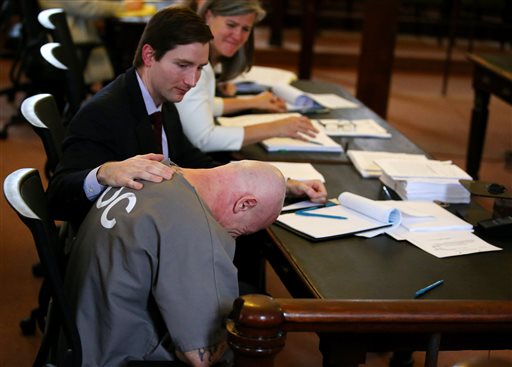
George Perrot, center, gets a hug from his attorney Nicholas Perros after a trial judge ordered him to be released yesterday on his own recognizance after his bail hearing inside the Bristol County Superior Court in New Bedford. (Jonathan Wiggs/The Boston Globe via AP)
DENISE LAVOIE, Associated Press
NEW BEDFORD (AP) — A man who spent three decades in prison for a rape conviction based in part on one strand of hair was freed Wednesday after a judge said he is “reasonably sure” the man is innocent and believes prosecutors cannot win a conviction at a retrial.
George Perrot was convicted of raping 78-year-old Mary Prekop in her Springfield home in 1985. Last month, Judge Robert Kane granted Perrot a new trial after finding that an FBI agent’s testimony about microscopic hair evidence was flawed. The agent said in no uncertain terms that a hair found in the victim’s home was a match for Perrot’s.
On Wednesday, the judge released Perrot on personal recognizance after saying he believes there is strong evidence that Perrot did not rape Prekop.

George Perrot, left, hugs his mother Beverly Garrant yesterday in Superior Court in New Bedford after Judge Robert Kane ordered Perrot released from prison. Kane granted Perrot, who spent three decades in prison, a new trial last month, citing flawed FBI testimony about microscopic hair analysis. (AP Photo/Denise Lavoie)
After the judge’s ruling, Perrot gave his mother, Beverly Garrant, a long embrace as tears filled their eyes. Then, Perrot told his mother, “Come on, Mommy. Let’s get out of here.”
Garrant said she was “so happy” her son was going home.
“I’m just so glad that the Lord gave him another chance,” she said.
Perrot, who was 17 when he was arrested, is now 48. He has always denied raping Prekop.
The U.S. Department of Justice flagged Perrot’s case in 2014 as one of hundreds that involved erroneous statements from FBI agents about hair analysis. Microscopic hair analysis has since been found to be far from exact. The FBI now acknowledges that the science is not conclusive and uses it only in conjunction with DNA testing.
The judge said there were other problems at Perrot’s trial.
Prekop repeatedly described the man who beat and raped her as a man without any facial hair. On the night of the attack, Nov. 30, 1985, Perrot had a beard and a mustache.

Beverly Garrant, mother of George Perrot, cries yesterday in Superior Court in New Bedford after Judge Robert Kane ordered her son’s release from prison. Kane granted Perrot, who spent three decades in prison, a new trial last month, citing flawed FBI testimony about microscopic hair analysis. (AP Photo/Denise Lavoie)
Prekop refused to identify Perrot as her attacker in a lineup. When she was shown his lineup photo during his trial and asked if he was her attacker, she replied, “How can I say it when this man has a mustache and a beard?”
Assistant District Attorney Elizabeth Dunphy Farris asked the judge to keep Perrot locked up and deny him bail, citing his lengthy disciplinary record in prison, which included 44 reports for fighting with other inmates and use of drugs. She also cited several escape attempts by Perrot and an incident in 2003 when Perrot fled to Maine after the Massachusetts Appeals Court overturned a judge’s ruling granting him a new trial. Dunphy did not say whether prosecutors will appeal the judge’s order or whether they will re-try Perrot.
The judge acknowledged Perrot’s record of disobeying rules in prison but said Perrot has a strong support network of friends and family to help him.
Perrot’s case for a new trial was championed by lawyers from The Innocence Project and the Schuster Institute for Investigative Journalism at Brandeis University in Waltham.


